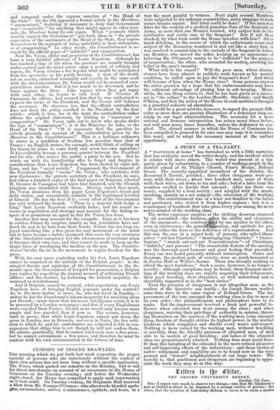A STORY OF A TEA-PARTY.
A" TRAVELLER at home" has furnished us with a little narrative that has evidently moved the writer deeply, and the incident which it relates will move others. The writer was present at a tea- party, given by subscription, to a number of working people in the district school of St. Church, Friar's Mount, Bethnal Green. The recently-appointed incumbent of the district, the Reverend S. Trevitt, presided ; three other clergymen were pre- sent, with their wives ; about two hundred men, some of them -with their wives, sat down to tea and cake ; but at a later hour the numbers swelled to double that amount. After tea there was music, supplied by a local society and mingled with the music, speaking, mainly on a set subjectLthe education of the working- men. The entertainment was of a kind not familiar to the ladies and gentlemen who visited it from higher regions ; but it is a counterpart of hundreds that take place every year among the more active-minded of the working class.
The writer expresses surprise at the striking decorum observed
by all assembled—the fairness, n the ab.lity and eloquence,
of the arguments ; the courtes by one speaker to the other, even in controversy; the gene tion, and aptitude for per-
ceiving either the force or the de menu of a representation. And this was the case in a mixed body of persons, who called them- selves "red-hot Chartists," "thoroughgoing Chartists," "Protec- tionists," "stanch out-and-out Nonconformists "—of Christians, "Infidels," and parsons ! "The remarkable feature of the meeting was the thorough good humour and good feeling that prevailed. Every one was heard patiently without interruption. Order and decorum, the modern gods of society, were as much honoured as in Exeter Hall or Willis's Rooms. There was literally nothing to offend the most fastidious." Such a scene, however, is no longer a novelty : although exceptions may be found, these frequent meet- ings of the working class are rapidly acquiring their refinements, their good breeding, their etiquettes, as well understood and as cheerfully supported as in the "best circles." Even the presence of clergymen is not altogether new, as the readers of the Spectator can testify ; for Joseph Brown worked some time since in the same region of Bethnal Green. The im- provement of the tone amongst the working class is due to men of its own order—the philanthropists and philosophers born to its ranks. But the improvement received a fresh and powerful in- fluence when educated men went among the class ; and when clergymen, waiving their privilege of authority in opinion, throw- ing themselves on the courtesy of the working men, come amongst them freedom of thought attains its highest power, in the mutual kindness which recognizes and shields every man's self-respect. Nothing is more valued by the working men, without truckling or servility, than the friendly presence of educated men, of men able to be models of good breeding ; and ladies of the educated class are proportionately admired. Nothing does more social bene- fit than this mingling of the educated in the more refined pleasures and self-improving efforts of the industrious : and these circles of native refinement and capability are to be found now in the very poorest and "lowest" neighbourhoods of our large towns. The novelty is, that gentlemen and clergymen are beginning to appre- ciate the work they may do in this way.


























 Previous page
Previous page